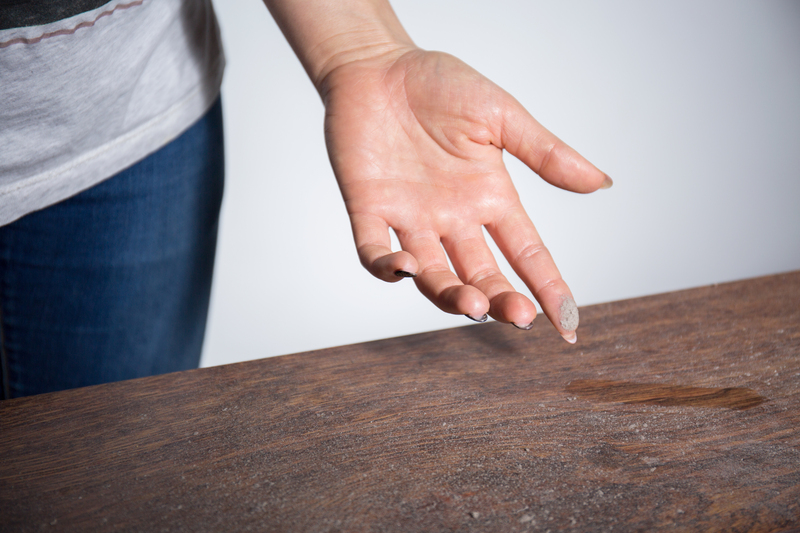Gorgeous Glow: Unveil Jewellery Cleaning Mysteries
Posted on 14/09/2025
Gorgeous Glow: Unveil Jewellery Cleaning Mysteries
Jewellery--whether it's a sparkling diamond ring, lustrous pearls, or an heirloom silver locket--holds more than just material value. Every piece tells a story, marks an occasion, or simply adds brilliance to your day-to-day style. Over time, however, even the most cherished jewels can lose their radiant glow. This illuminating guide pulls back the curtain on jewellery cleaning mysteries and reveals the secrets to preserving your treasures' stunning shine for generations to come.
Why Jewellery Loses Its Luster
Before exploring jewelry cleaning solutions, it's essential to understand why your favorite pieces dull over time.
- Everyday Wear: Exposure to lotions, perfumes, hair sprays, and natural body oils.
- Environmental Factors: Dust, dirt, and humidity can cause tarnish and cloudiness.
- Chemical Reactions: Chlorine, cleaning agents, and even soap residue can impact metals and stones.
- Physical Contact: Scratches and abrasions from even gentle bumps may affect a gemstone's natural sparkle.

The Ultimate Step-by-Step Jewellery Cleaning Guide
1. Identify Your Jewellery Type
Not all jewellery is created equal. Gold, silver, platinum, diamonds, pearls, and costume jewellery each require specific care. Start by sorting your jewellery into:
- Precious Metals (gold, silver, platinum)
- Gemstones (diamonds, sapphires, rubies)
- Soft Stones (emeralds, opals, turquoise)
- Organic Materials (pearls, coral, amber)
- Costume/Fashion Jewellery (rhinestones, plated metals)
2. Essential Tools for a Gorgeous Glow
Before beginning any cleaning, gather these must-have supplies:
- Soft-bristle toothbrush (dedicated to jewellery use)
- Microfiber or lint-free cloth
- Lukewarm water
- Mild dish soap (free from harsh detergents)
- Bowl (never clean jewellery directly over a sink!)
- Jewellery polishing cloth (for extra sparkle)
- Optional: Ammonia-based cleaner, baking soda, or commercial jewellery cleaner (based on stone/metal type)
How to Clean Different Jewellery Types
1. Gold Jewellery Cleaning Techniques
Gold is a highly valued metal known for its timeless glow, but it can easily collect grime and lose luster
- Mix: Mild dish soap with lukewarm water in a bowl.
- Soak: Place gold jewellery in the solution for 10-15 minutes.
- Brush Gently: Use a soft toothbrush to reach intricate details.
- Rinse: Under running lukewarm water (plug the drain!)
- Dry: Pat with a microfiber cloth.
- Polish: Buff gently with a jewellery polishing cloth for that signature gorgeous glow.
2. Silver Jewellery: Banishing Tarnish
Silver's biggest adversary is tarnish, a dulling effect caused by oxidation. Here's how to reveal its true brilliance:
- Formula: Combine a few drops of mild dish soap with warm water.
- Cleansing: Dip a soft cloth into the solution and rub each piece gently.
- Tarnish Removal: For stubborn tarnish, create a paste using baking soda and water. Rub gently, rinse, and dry thoroughly.
- Tip: Avoid silver dips for pieces with gemstones--they may loosen the setting or damage the stone.
3. Diamonds and Gemstone Jewellery: Unlock the Sparkle
Diamonds and sturdy gemstones (such as sapphires and rubies) are fairly tough but can get clouded by grease and residue:
- Soak: In a solution of mild dishwashing liquid and warm water.
- Brush: Use a soft brush to clean behind stones and in settings.
- Rinse: In cool water and pat dry with a lint-free cloth.
- Secret Tip: For added shine, a quick dip in a diluted ammonia solution does wonders, but always rinse thoroughly.
4. Cleaning Delicate and Soft Stones
Opals, turquoise, pearls, and emeralds are porous and sensitive. Aggressive chemicals or scrubbing can spell disaster. Use the gentlest approach:
- Dampen: A soft cloth with clean water--no soaking!
- Wipe: Surface dirt with extreme care. Avoid submerging in liquid.
- Dry: Immediately after cleaning.
- Pearls: To maintain their gorgeous glow, wear often--they absorb your skin's natural oils. Store separately.
5. Caring for Costume Jewellery
Costume jewellery is often made with plated metals and glued stones. Prolong their luster by:
- Spot clean only. Never soak or use harsh chemicals.
- Soft cloth: Gently wipe surfaces to remove oils.
- Store: In a dry place, away from moisture and sunlight.
Jewellery Cleaning Myths Debunked
The world of jewellery care is filled with myths that, if followed, could actually harm your precious pieces. Let's shed some light on these cleaning mysteries:
- Myth: Toothpaste is great for cleaning jewellery.
Fact: Toothpaste is highly abrasive and can scratch both metals and soft stones. - Myth: Bleach disinfects and cleans jewellery.
Fact: Bleach seriously damages gold, silver, and gemstones. - Myth: Ultrasonic cleaners are always safe.
Fact: While perfect for diamonds and gold, ultrasonic cleaners may crack soft stones or loosen glued settings. - Myth: Soaking all jewellery together is fine.
Fact: Gemstones and metals have different care needs; mixing can lead to scratching or chemical damage.
Pro Tips for a Long-Lasting Jewellery Glow
- Remove jewellery before swimming, cleaning, or applying lotions. Chlorine, chemicals, and even soap can cause premature tarnishing or stone loosening.
- Store pieces separately. Use fabric-lined jewellery boxes or soft pouches to avoid scratches and tangles.
- Check for loose stones or clasps regularly. Have repairs done promptly to prevent loss or further damage.
- Consider professional cleaning annually. Some pieces with intricate settings or antique value deserve expert care.
- Document your jewellery's value, settings, and stones for insurance and peace of mind.
The Art of Polishing: Bringing Back the Gorgeous Glow
Sometimes a gentle cleaning isn't enough--a deep polish is needed to restore the original glow. Here's how to polish jewellery safely:
Use a Polishing Cloth
- Available at most jewellery stores or online, polishing cloths are specially treated to enhance shine without scratching.
- Rub gently in one direction for best results.
- Avoid over-polishing, especially on plated pieces as it can wear down the finish.
DIY Home Polishing Solutions
- For Silver: Use a paste of baking soda and water. Apply with a soft cloth, rinse, and buff dry.
- For Gold: A mixture of mild soap and warm water works best.
- For Gemstones: Always stick to mild soap and avoid chemical dips.
Warning: Do not use abrasive powders, household cleaning sprays, or rough cloths on any precious jewellery.
How Often Should You Clean Your Jewellery?
The frequency of cleaning depends on how often you wear your jewellery and its exposure to dirt or chemicals. For daily-wear pieces like engagement rings or favorite necklaces, a gentle cleaning once every two weeks is ideal. Less-worn pieces may only need a few cleanings a year.
- Daily Wear: Clean bi-weekly to maintain optimum sparkle.
- Occasional Wear: Clean every 2-3 months, or before a special occasion.
- Family Heirlooms: Consult a professional for antique or fragile pieces.
Professional Jewellery Cleaning: When to Seek Expert Help
While home jewellery cleaning is effective for most pieces, there are times when expert assessment is necessary.
- Complicated Settings: Intricate lacework or cluster-set jewels may need ultrasonic cleaning and stone checks.
- Heirloom Restoration: Antique jewellery often holds sentimental and historical value best tended by a professional.
- Heavily Tarnished or Damaged Pieces: When home methods can't bring back the gorgeous glow, a jeweller can.
Safe Storage: Preventing Jewellery Tarnish and Dust
Proper storage is as important as cleaning in the fight against tarnish and dullness. Follow these tips for lifelong brilliance:
- Store metals separately to prevent chemical reactions and scratching.
- Invest in anti-tarnish strips for silver pieces.
- Store pearls and opals in breathable cloth--not airtight containers--to prevent moisture buildup.
- Keep away from direct sunlight or humidity.

Jewellery Cleaning Frequently Asked Questions (FAQs)
Can I use vinegar to clean my jewellery?
No. Vinegar is acid-based and can etch or damage many stones and metals. Stick to mild soapy water or commercial cleaners recommended by jewellers.
How do I revive dull gemstones?
Grease and grime can cloud gemstones. Use a mild soap solution and soft brush to lift away residue--and never use harsh chemicals or abrasive pads.
Is it safe to clean all jewellery together?
Never. Mix only similar metals and stones. Hard stones like diamonds can scratch softer gems and metals in a shared solution or bowl.
Why does my silver tarnish so quickly?
Exposure to air, sweat, perfumes, and even wool accelerates silver tarnishing. Store silver in anti-tarnish pouches or use special strips for extended storage.
Do commercial cleaners work better than homemade solutions?
Commercial cleaners can be effective if matched to your jewellery's material. However, mild homemade solutions (soap and water) are safest for most pieces.
Preserving Your Jewellery's Gorgeous Glow
Maintaining the gorgeous glow of your jewellery isn't just about aesthetics--it's about honoring memories and maximizing your pieces' longevity and value. With careful, regular cleaning and smart storage, even the most cherished and delicate jewels can sparkle for decades to come.
- Read labels before applying anything to your treasures.
- Be gentle; less is more.
- When in doubt, ask a professional jeweller for advice.
Unveiling the mysteries behind jewellery cleaning preserves not just the stunning look of your precious pieces, but also the stories and love they embody. Start your journey towards a gorgeous glow today!
Shine on with confidence--because the secrets to jewellery cleaning no longer need to be a mystery.


